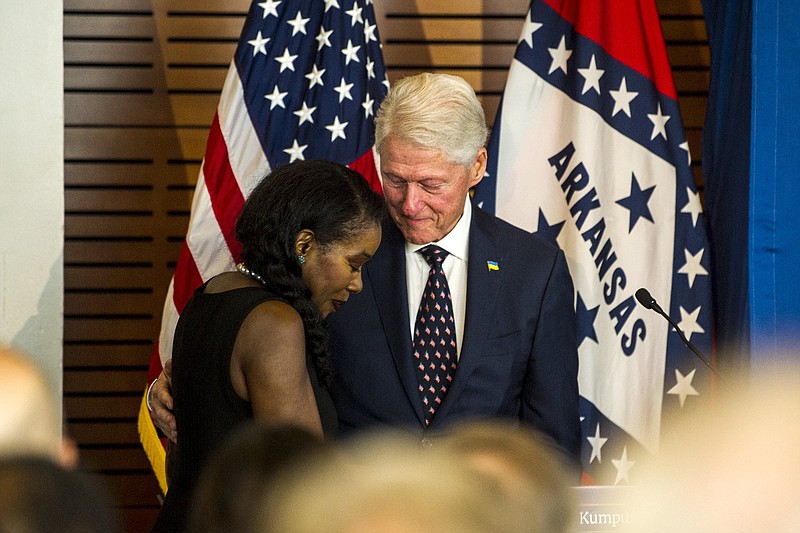Author Isabel Wilkerson told an audience of more than 400 Wednesday evening that she grieves for those who haven't had the chance to "know the country's true and full history," during her speech part of the Clinton Presidential Center's Kumpuris Distinguished Lecture Series.
Rather than look away, Wilkerson's work asks readers to examine closely the condition of the United States. In recent times, her fellow Americans might say, "I don't recognize my country," but for Wilkerson, the nation is like an old house. After a heavy rain, the house's owner might not want to enter the basement, she said, yet choosing to not look won't free them from the responsibility of repairing the damages.
"Ignorance is no protection from the consequences of one's inaction," Wilkerson said. "In other words, we are all inheritors of this very old house, 246 years old, and we are the ones responsible for whatever condition it happens to be in."
While present-day Americans did not build the nation, Wilkerson said it is on them to do what is necessary to fix it.
Wilkerson is the author of "The Warmth of Other Suns" and "Caste: The Origins of Our Discontents." During Wednesday's event, Wilkerson spoke about topics including castes, the coronavirus pandemic and the Capitol riot, before entering a conversation with Victoria DeFrancesco Soto, dean of the Clinton School of Public Service at the University of Arkansas.
Wilkerson grew up in Washington, D.C., after her parents migrated from the Jim Crow South. She graduated from Howard University before embarking on a career in journalism.
As the Chicago bureau chief for the New York Times, Wilkerson won the 1994 Pulitzer Prize for feature writing, becoming the first African-American woman to win the prize for journalism. She then spent 15 years interviewing more than 1,200 individuals to complete "The Warmth of Other Suns," which tells the story of 6 million people migrating from the Jim Crow South.
Her latest book, "Caste: The Origins of Our Discontents," explores the unspoken hierarchy of caste in America, its history and its consequences. Wilkerson defines eight pillars underlying caste systems across civilizations and documents the parallels between the American caste system and the hierarchies present in India and Nazi Germany.
Readers of "Caste" discover the inner workings of an American hierarchy surpassing the limitations of race, class and gender, according to the author's website, leaving the book with a greater understanding of the "price we all pay in a society torn by artificial divisions."
"Caste is the infrastructure of our divisions. It is the architecture of human hierarchy, the subconscious code of instructions for maintaining, in our case, a four-hundred-year-old social order," Wilkerson writes. "Looking at caste is like holding the country's X-ray up to the light."
Wilkerson on Wednesday said the book is one she "didn't want to write." However, she said she felt drawn to the subject while researching the Jim Crow South.
Wilkerson said the idea that those in the dominant group had to be completely separate from others propelled her to look more into the concept of caste, which she said few people would ever think of connecting to the United States.
During the lecture, Wilkerson told a story from one of the first events she did following her second book's release. She said the moderator told her, "We've gone through so much as a country." The year 2020 had already brought to the nation a global pandemic, a fraught presidential election and uprisings following the death of George Floyd, and now, Wilkerson had dropped "Caste" on the United States, the moderator said. But Wilkerson told the audience she did not drop "Caste" on anyone.
"Caste is with us, whether we see it or not. Caste is working within our society whether we recognize it or not. It is undermining our democracy, whether we name it or not," Wilkerson said. "So we might as well name it, and you might as well understand that which we're up against, and that is what set me on the path toward trying to understand what it is that we're dealing with as a country."
As they began their conversation, Soto thanked Wilkerson for writing the book she did not want to write. She said by writing "Caste," Wilkerson had turned on an X-ray machine and brought into relief the caste system which the nation could not see.
After Soto asked her how castes manifests through generations, Wilkerson shared her belief in the possibility of connection and the impact of small, daily interactions. She said the nation needs to recognize that "all of us are one," no matter age, race or gender.
"If you're fighting caste, you're fighting all of the artificial divisions human beings have created," Wilkerson said. "And we will be encouraging, and we will be excited for those who have been held down for so long to succeed because that means we have more people, more tools, more resources to fight."
Former President Bill Clinton introduced Wilkerson before the lecture. During his remarks, he said he is indebted to the author for chronicling the Great Migration, as his "whole campaign was based on people from Arkansas who had sought the 'Warmth of Other Suns.'"
However, he said Wilkerson's second book compelled him to invite her to speak at the Presidential Center. Clinton said the book changed the way he understood the world and forced him to rethink his deeply embedded preconceptions while still offering a path forward.
"Even though America's caste structure has persisted for about 400 years now, there's still hope," Clinton said. "She said every time we truly see and connect with the humanity first and foremost, it helps to break down caste."
Gallery: Kumpuris Distinguished Lecture
